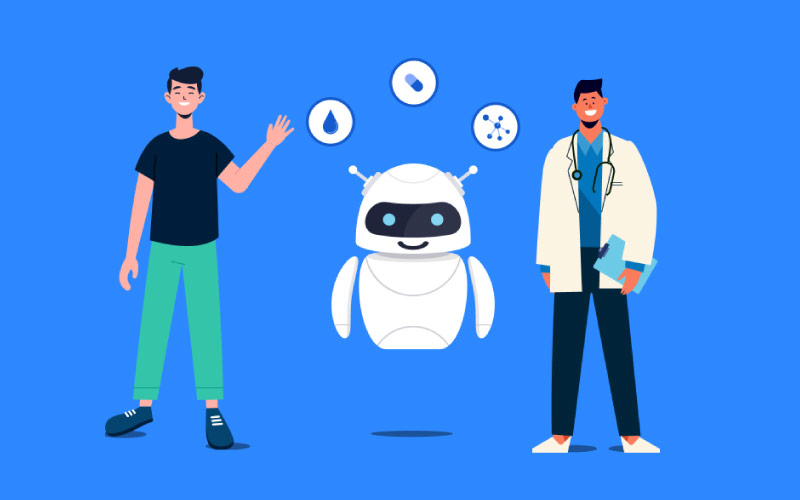The rise of chatbots in healthcare marketing is revolutionizing the way how customers are interacting and building engagement with healthcare organizations.
Chatbots are changing the healthcare marketing landscape by providing tailored information to patients, real-time support with zero waiting time, collecting patient data, understanding present medical needs and anticipating further pain points, etc.
These intelligent virtual assistants/chatbots not only enhance customer engagement but also streamline lead generation, improve customer support, and do much more. Moreover, they have provided reliability and convenience to patients by providing timely assistance and avoiding unnecessarily paid consultations.
Let us read more about how chatbots in the healthcare industry are creating win-win solutions for both, healthcare organizations and patients.
Benefits of Chatbots in Healthcare Marketing

1. Answering Patient Queries On Time
In the healthcare industry, being available to the customers at the time they need is the biggest support a brand will provide to its customers.
Chatbots in healthcare marketing have made customers worry-free by answering patient queries on time. Customers earlier had to rely on random Google search answers and other resources on the internet. Customers can now chat directly with the brand they trust and get immediate answers for their queries.
2. Interactive and Conversational Approach with 24/7 Support
Before the implementation of chatbots in healthcare marketing, customers used traditional marketing channels to communicate that were not accessible 24/7. They had to wait for the executive to answer their queries or clear their doubts by visiting the hospital.
Chatbots are a convenient form of communication that is allowing users to engage in real-time conversations allowing for personalized interactions and addressing specific queries and concerns of the customer around-the-clock.
3. Increases Patient Engagement and Customer Satisfaction
Chatbots in healthcare marketing are guiding customers and potential customers with various stages of the customer journey from helping with various medical processes as per their requirements. Leading the patients before conversion and directing them to a seamless experience after the conversion is helping healthcare organizations in increased patient engagement.
Chatbots provide instant responses to queries, and send personalized recommendations and offers related to their health concern, helping healthcare organizations in building brand reputation and increase customer satisfaction.
4. Automate Appointments, Reminders, and Follow-ups
Chatbots in healthcare marketing are helping customers with automated upcoming appointments, reminders about their next medical process, follow-up emails, and medication refill notifications.
Chatbots are also used to follow up with patients after their visit by providing post-care instructions, dosage information, healthcare routine, do’s and don’ts after treatment, collecting reviews about their experience, etc.
5. Market Research and Feedback

Customer preferences change frequently, and brands should be able to understand them before their competitors.
Using chatbots in healthcare marketing is one of the effective ways to understand patient feedback about their experience with healthcare services and products.
Chatbots can conduct customized surveys according to each buyer persona, gather ratings, and use sentiment analysis to understand patient pain points, challenges, areas of improvement, etc.
6. Seamless User Journey
From assisting patients starting from appointments & follow-ups to answering their queries in real-time, providing post-care instruction, and sending self-care routines, chatbots are being implemented in all the processes of the customer journey providing a seamless customer experience at their convenience and comfort.
Patients find it helpful when they get round-the-clock support for frequently asked questions, insurance inquiries, healthcare tips, educational information regarding their medical condition, etc.
Healthcare chatbots are successful in building engagement with patients and are strengthening the relationship between patients and healthcare organizations.
Conclusion

Apart from using chatbots in healthcare marketing, trained chatbots are also playing a major role in assisting patients with mental health support.
Patients find it easy when they get access to relevant real-time information from the resource which they consider as authentic. Patients are able to trust brands that provide 24/7 support for their medical conditions. Chatbots are playing a crucial role in collecting patients’ data, engaging them through various relevant services, educating patients with newly updated information, etc. The use of chatbots and AI in healthcare marketing continues to grow. Healthcare organizations are leveraging chatbots that are dynamic in Natural Language Processing, chatbots that help in anticipating patient needs, understanding their pain points before they realize them, and providing seamless human-like support.
